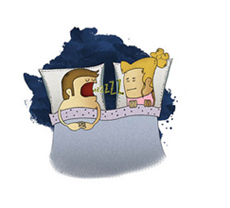Tips for restful sleep

Sleep is important for your physical, mental and emotional development. But what if you don't sleep through the night, have difficulty falling asleep, or wake up far too early? An expert from the Medical Center – University of Freiburg knows some helpful tips.
Certain disruptive factors, such as noise, can easily be remedied. But other sleep disorders may have a psychological cause, or occur due to a physical problem. Long-term negative effects on mental health are the consequences. Sleep disorders should be treated "if they persist for at least four weeks, if those affected are suffering and if the sleep deficit has negative effects during the day," explains Professor Dr. Dieter Riemann, psychologist and head of the sleep laboratory in the Department of Psychiatry and Psychotherapy at the Medical Center – University of Freiburg.
Noise – reduce snoring sounds
One of the most common causes of bad sleep is noise of a certain intensity such as road traffic, passing trains or aircraft sounds. A snoring partner can also become a real burden, because snoring noises reach peak values of 80 to 100 decibels. "In some cases, only ear plugs help, or as a last resort a separate bedroom," says sleep doctor Professor Riemann. In order to prevent the snorer from being banned from the room, the sleep expert advises him to abstain from alcohol, reduce weight, or possibly to undergo a surgical procedure that can reduce the volume.
Alcohol – no friend to the sleeper
Many people treat themselves to a glass of wine in the evening as a nightcap. At first the alcohol has a soothing, soporific effect. But Professor Riemann emphasizes: "As soon as the effect subsides after four to five hours, you wake up more frequently and sleep more restlessly." This applies even to small quantities of alcohol such as one or two glasses of wine. With increasing age, this effect also increases.
Evening sport disturbs sleep – and sex?
High-performance sport after 9 or 10pm can degrade sleep quality. "When you exercise intensively late in the evening, the body pours out a high concentration of stress hormones, which affects sleep," explains sleep researcher Professor Riemann. Therefore, reschedule the sport to the early evening hours, and allow sufficient time for relaxation afterwards. This also applies to unsettling media consumption such as action movies or computer games. Sexual activity, on the other hand, stimulates the body but has a soporific effect because the body is relaxed afterwards.
Off to the doctor: sleep apnea
About five percent of the population are affected by nightly breathing interruptions, or sleep apnea. In this physical disorder, breathing can be suspended during sleep as often as 100 times for ten seconds or more. The cause of this is often a droopy pharyngeal and palatine musculature, which closes the airways due to suction during inhalation. Loud snoring can also be an indication of sleep apnea. "If the affected people wake up, they usually feel as if they have slept well, but they never really feel fit," explains Professor Riemann. Sleep apnea can lead to concomitant diseases such as cardiac arrhythmia or hypertension. "If sleep apnea is suspected, it is imperative that an examination in the sleep laboratory and, if necessary, medically supervised treatment be carried out," warns Professor Riemann.
Worries und problems – stop the Worry Monster
Absolutely taboo for a good sleep is brooding in bed. Those who are nonetheless plagued by worries and problems should sit in a "thinking chair" in a different room before going to sleep. There, the problems that concern you can for example be written down in a notebook where you try to find solutions for the following day. If you can't get rid of the Worry Monster, you should practice the "thought stop technique". In this, you picture an imaginary stop sign in order to keep your thoughts from going around in circles. It also helps to quietly say "stop". It is important to banish disturbing thoughts and set a pleasant idea in their place. "Brooding especially plagues the early morning hours and is associated with low spirits, but can also indicate depression," Professor Riemann adds for consideration.
Hands off sleeping pills
"Taking sleeping pills means taking risks," warns the sleep expert. This could lead in long-term use to a loss of effectiveness, or to drug dependence. Instead, the scientist recommends psychotherapeutic methods such as mindfulness exercises, relaxation techniques, methods for better structuring the sleep-wake rhythm, and psychological techniques to reduce nightly worries. Anyone who still needs to use sleeping pills should do so only under medical supervision.
Back